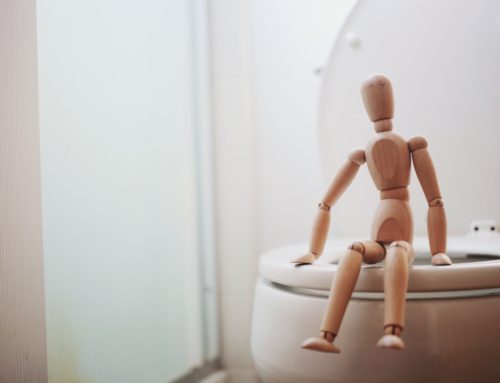By Dr. Angelina Riopel
Getting to the root of constipation begins with understanding what causes constipation and how dietary choices impact our digestive health. When we are constipated the toxins from the stool become reabsorbed and recycled through the body. Improper elimination of waste can lead to inflammation, chronic digestive concerns, allergies, skin rashes, eczema, fatigue as well as many other symptoms. Adopting natural ways to help constipation, such as increasing fiber intake and regular exercise, can promote smoother digestive processes and prevent the reabsorption of toxins.
What is a Normal Bowel Movement?
Normal is a pretty loose term, but you should be having at least one bowel movement every day and it should feel like you have completely evacuated your bowel. The stool should be formed, not hard or pellet-like, loose or watery. Blood and mucus is not normal.
Common Causes of Constipation:
Low Dietary Fiber
Low dietary fiber is often identified as the root cause of your constipation. The Standard American Diet (SAD), characterized by its minimal fiber content, typically leads to fewer than three bowel movements a week. This insufficient fiber intake fails to create bulk in the stool, which is necessary for stimulating muscle contractions along the colon and promoting regular intestinal movements. Increasing dietary fiber can help relieve constipation, support the frequency of bowel movements, and prevent constipation by improving peristalsis—the rhythmic contraction of the intestine.
Dehydration
Dehydration severely impacts bowel function, leading to hard, pellet-like stools that are difficult to pass. This condition, often paired with low fiber intake, exacerbates constipation symptoms. To treat constipation effectively and alleviate these symptoms, it’s crucial to increase water intake. Hydration helps absorb water in the large intestine, softening the stool and making it easier to pass, thus providing relief from the strain and discomfort associated with constipation.
Electrolyte Imbalance
An electrolyte imbalance can cause constipation by contributing to dehydration and reducing intestinal function. Factors like stress, excessive sweating, and insufficient electrolyte intake disrupt the balance necessary for proper muscle contractions in the intestine. Addressing these imbalances can help relieve constipation and restore normal bowel movements.
Food allergies & Food Intolerances
Food allergies and intolerances can lead to inflammation of the digestive tract, which may cause constipation. Recognizing and eliminating allergenic or intolerant foods from your diet can significantly relieve constipation symptoms and help manage this condition.
Unhealthy Gut Flora & Microbiome
A healthy gut microbiome is essential to healthy digestion and bowel movements. Many factors in our diet and lifestyle contribute to the disruption and imbalance of our gut microbiome. We are all trying to drink more water, but if you’re drinking tap water, it could be disrupting your microbiome! Tap water is a source of many toxins and chemicals like chlorine, heavy metals and pharmaceutical medications, including antibiotics that damage healthy gut flora. Other factors include a diet low in probiotics and fermented food, antibiotic use, pesticides from our food, stress and unfortunately, the list goes on. Our modern day lifestyle is quite disruptive to our microbiome.
Stress
Stress affects bowel function, through what is known as the Gut-Brain Axis. The gut and brain communicate back and forth through the Vagus Nerve and regulate healthy digestive function. Stress can inhibit signals sent to the gut through the Vagus Nerve, which can cause constipation and other digestive issues.
Addressing the Root Causes of Constipation:
As you can see, many of the factors contributing to constipation are linked together. The following are steps that you can take to help improve your gut health and address constipation. Should constipation persist, you may consider having functional testing done through a Naturopathic Doctor to assess other factors that may be contributing to constipation, such as food sensitivities and your microbiome health.
Dietary Factors
- Increase dietary fiber in your diet. Fiber from fruits, vegetables, whole grains, beans and legumes, contains both soluble and insoluble fiber, which helps to bulk the stool. Root vegetables like yams, sweet potatoes, carrots and beets contain prebiotics as well, which help feed the good bacteria in your gut.
- Consume fermented foods, including sauerkraut, kimchi, kefir, miso and kombucha to provide your gut with healthy bacteria to nourish your Microbiome.
- Enjoy bone broth to reduce inflammation and heal the gut wall.
- Drink clean, filtered water to avoid toxins and antibiotics that damage the microbiome.
Hydration
Maintaining proper hydration will help prevent constipation and promote good intestinal health. Drinking clean, filtered water throughout the day helps absorb water in the colon, facilitating easier stool passage. It is important to replace lost electrolytes, especially after physical activity, to support muscle contractions in the intestine and prevent constipation. Including water-rich fruits and vegetables like apples, celery, cucumbers, and coconut water in your diet can improve hydration and provide the necessary minerals. However, be cautious with caffeinated beverages, as caffeine can cause dehydration. For every caffeinated drink consumed, replenishing with two glasses of water is recommended to counteract the diuretic effect and help relieve constipation symptoms.
Stress Management
Managing stress effectively, you will be able to maintain good overall digestive health and can help relieve symptoms of constipation. High-stress levels may cause functional constipation by affecting the regular contraction of digestive muscles. Techniques such as exercise, deep breathing, meditation, and acupuncture are beneficial in regulating the body’s stress response. These practices not only alleviate stress but also improve the frequency of bowel movements and prevent chronic constipation. Integrating regular stress management routines can significantly reduce the risk of constipation and improve gut health.
Naturopathy and Constipation: How Naturopathic Treatments Can Help
Understanding and getting to the root causes of constipation can significantly improve one’s health and wellness. By exploring natural remedies and making informed lifestyle changes, individuals can relieve constipation effectively. At Innate Wellness, our naturopathic approach focuses on individual health needs to devise personalized treatments that promote digestive health and prevent future issues. For more information on how to relieve constipation naturally and improve your gut health, contact us today. Embrace a healthier lifestyle with our naturopathic services, getting to the root of constipation and enjoying lasting relief.






